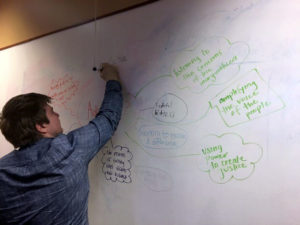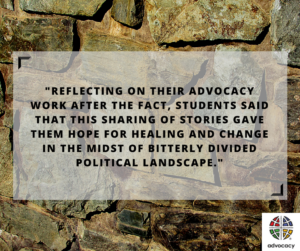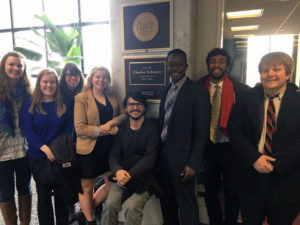By: Rev. Rebecca Seely
This past March, a group of college and graduate students from the Lutheran and ecumenical campus ministry, which I serve in New York City, travelled to Washington, D.C. on a spring break “faith in action” pilgrimage. While most of our students were familiar with putting their faith into action through direct service to neighbors, our purpose on this trip was to affect change in a different way – through advocacy to elected officials. We are grateful to ELCA Advocacy Washington, D.C. office, who hosted us, taught us about their work, trained us as advocates and set up meetings for us with the offices of our senators from New York. While in Washington, we were able to learn about and advocate for legislation on immigration and food insecurity that would affect millions of people across our country.
Advocacy is not a new concept for our campus ministry. We have regular teach-ins around justice issues, have hosted phone banks to call our elected officials, written letters and signed petitions. Meeting face to face with policy makers on this trip was a first, however, and our students went into this pilgrimage both nervous and excited to make their voices heard for the sake of their neighbors.
Our time in D.C. began with an orientation meeting with Nathan Detweiler at the ELCA Advocacy office. In retrospect, I think  the group’s general expectation was that it would be a “training” – that Nathan would equip us with statistics and facts and a script that we would take into our meetings with policy makers, not unlike the form letters that one signs on the internet. We were a little surprised, therefore, when he encouraged us to look inward instead and figure out how these issues impacted our lives and our communities. He told us that our own stories were our most powerful gifts for advocacy and set us to work figuring out what stories God was calling us to share.
the group’s general expectation was that it would be a “training” – that Nathan would equip us with statistics and facts and a script that we would take into our meetings with policy makers, not unlike the form letters that one signs on the internet. We were a little surprised, therefore, when he encouraged us to look inward instead and figure out how these issues impacted our lives and our communities. He told us that our own stories were our most powerful gifts for advocacy and set us to work figuring out what stories God was calling us to share.
As a result, some of the most meaningful work of our trip was the work of reflecting on the human stories – our own, those of our neighbors and those of Scripture – those incarnate “issues” for us. One student shared that a good friend may have to leave her college education behind to take care of her siblings if her mother is deported. Another student talked about his peers routinely going hungry during exam times when they can’t work as many shifts at their jobs. Students reread familiar biblical narratives as “immigration stories” and discovered the humanity of the biblical characters anew. Most affecting of all, at least for me, was that each student in our group discovered that he or she had a unique story or experience to offer that was vital to shaping our collective witness when we spoke to Senate staffers. Everyone’s voice made a difference.
 Reflecting on their advocacy work after the fact, students said that this sharing of stories gave them hope for healing and change in the midst of bitterly divided political landscape. Sitting down and having a real conversation with someone of different political convictions is something that almost never happens among college students today. With the heated rhetoric that flies around social media, students, like many of us, are often afraid to engage with those they assume will disagree. During this trip, however, students had the chance to do just that and it was powerful for them.
Reflecting on their advocacy work after the fact, students said that this sharing of stories gave them hope for healing and change in the midst of bitterly divided political landscape. Sitting down and having a real conversation with someone of different political convictions is something that almost never happens among college students today. With the heated rhetoric that flies around social media, students, like many of us, are often afraid to engage with those they assume will disagree. During this trip, however, students had the chance to do just that and it was powerful for them.
Michelle, a sophomore at Columbia University, met with her home state senator’s office to talk about immigration and marveled  that, “With empowerment from a great group, I was able to work up the courage to have a meaningful and potentially impactful discussion with someone who probably didn’t agree with me.” In our divided nation, that’s a big deal. Moreover, the students reflected that hearing each other’s stories, building connections across difference and rediscovering each other’s shared humanity and belovedness in the eyes of God is a simple, profound way to begin healing our brokenness and building a better world.
that, “With empowerment from a great group, I was able to work up the courage to have a meaningful and potentially impactful discussion with someone who probably didn’t agree with me.” In our divided nation, that’s a big deal. Moreover, the students reflected that hearing each other’s stories, building connections across difference and rediscovering each other’s shared humanity and belovedness in the eyes of God is a simple, profound way to begin healing our brokenness and building a better world.
One of the most surprising things that students discovered on our advocacy pilgrimage is that faith can be the means of positive connection with strangers. Christian, a sophomore at NYU, reflected that before this trip, he would intentionally avoid mentioning his faith when he talked about social issues because not everyone believes in God. Bringing faith into the conversation in Washington, D.C. helped him and other students to realize that talking about faith is not something to be afraid of. In fact, speaking up for justice explicitly as people of faith can be a powerful way to build bridges with others and find points of connection with others, whatever their faith convictions.
Thank you to the ELCA Advocacy for making this empowering, transformational experience possible. In the months and years to come, we look forward to continuing to find ways to serve our neighbors, seek justice and bear witness to God’s love for the whole world through the holy work of advocacy.
